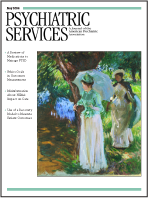Patients and Families and DSM Revision Process
To the Editor: In an article in the February issue, Drs. Sadler and Fulford (1) argue for including patients and their families in the DSM-V development process. In an accompanying Taking Issue piece, Dr. Spitzer (2) calls their argument "politically correct nonsense." Unfortunately, Dr. Spitzer focuses largely on the procedural aspects of the argument and not on whether the ideas behind the argument are scientific, reasonable, valid, and useful.
At the end of their article, Drs. Sadler and Fulford ask, "Who then is better able to help with developing DSMs than patients and families themselves?" We have heard similar arguments from individuals who treat substance use disorders. They argue that only those who have suffered from such disorders can treat them. Is this argument valid? I do not think so. Similarly, I do not think that Drs. Sadler and Fulford's argument that patients should contribute to formulating a diagnostic manual is valid. One reason is that I believe that their suggestion could reinforce the stigma associated with mental illness. What does the argument that "psychiatry is about patients" trying to imply? That the rest of medicine is not? Are we trying to set psychiatry apart from the rest of medicine and say that it is something special and different?
Drs. Sadler and Fulford present arguments for and against including patients and families in the DSM development process. However, they do not try to prove or disprove any of the arguments, nor do they enlighten us as to why they consider the arguments for such inclusion more valid than the arguments against it. They also argue that we need to keep our scientific priorities straight. Is bringing more politics into the revision of DSM more scientific? Did the inclusion of "relevant stakeholders" over the past 30 years make DSM more scientific?
Drs. Sadler and Fulford state that DSM should be a public policy instrument. Why should a diagnostic manual be a policy instrument? Treatment guidelines might be thought of in this way, but a diagnostic manual? We should focus our efforts on whether the diagnosis exists and is valid and not on whether it could be used in political or policy arguments. Interestingly, Drs. Sadler and Fulford do not entertain the possibility that bringing more stakeholders into the policy formulation process increases potential conflicts of interest.
DSM is a problematic document, and the process that Drs. Sadler and Fulford suggest would make it more problematic and political and less scientific. Dr. Spitzer makes a valid point when he states that the case for involving patients and families in the DSM revision process is "politically correct nonsense." Some people might argue that members of the Church of Scientology are stakeholders in the process. I hope that the next argument will not call for the inclusion of Scientologists.
Dr. Balon is professor of psychiatry at Wayne State University in Detroit.
1. 1.Sadler JZ, Fulford B: Should patients and their families contribute to the DSM-V process? Psychiatric Services 55:133–138, 2004Google Scholar
2. 2.Spitzer RL: Good idea or politically correct nonsense? Psychiatric Services 55:113, 2004Google Scholar



